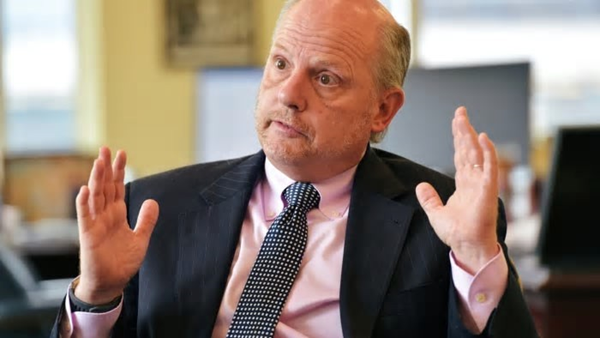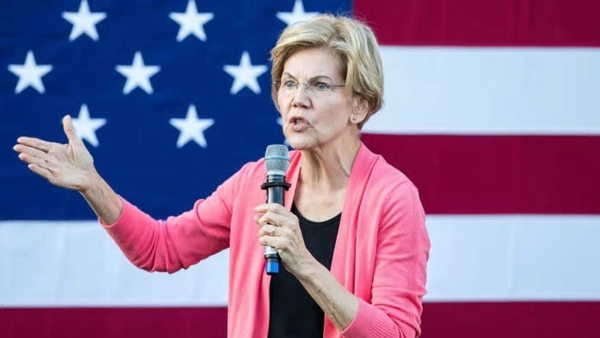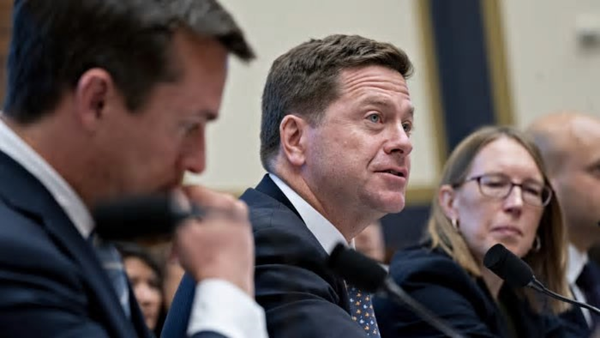|
Moral Money
Capitalism
Moral Money special: Leo Strine’s new
deal for corporate America
|

Leo Strine: 'I
unapologetically support the approach to managing the economy
that was begun in the New Deal and that is associated with
European social democracy' © Reuter
|
Gillian Tett, Andrew Edgecliffe-Johnson, Patrick
Temple-West and Billy Nauman
[OCTOBER 1,
2019]
As chief justice of the Delaware Supreme
Court since 2014, Leo Strine has been one of the most influential
judges in US corporate law. More than half of all publicly traded US
companies are domiciled in Delaware, making the small state the
epicentre of legal battles between shareholders and boards of
directors.
Mr Strine is about to retire. But before
he does, he is publishing a sweeping proposal for overhauling American
capitalism. He outlines his ideas in this FT opinion
column and
you can read his proposal in full here. Later this week, Mr
Strine will also present his ideas at a conference in Washington,
details of which can be found
here.
However, last week in his first
interview since announcing his retirement, Mr Strine spoke with Moral
Money, and what he said is likely to intensify the debate about how to
build a sustainable business.
Some free-market thinkers may hate his
ideas. Others may love them, particularly on the left. Either way, Mr
Strine’s key point is this: rather than advance a Green New Deal, as
liberal congresswoman Alexandria Ocasio-Cortez has proposed, he hopes
to renew America’s commitment to former Democratic president Franklin
Roosevelt’s original New Deal, focusing on worker rights.
Mr Strine’s “comprehensive proposal”
calls on big companies to create board-level committees focused on
employees’ interests; it urges asset managers to consider their
beneficiaries’ investment horizons and “human interests” when voting;
and it recommends changing the holding period for long-term capital
gains from one year to five, establishing a financial transaction tax,
and closing the carried interest tax loophole.
This is likely to spur discussion inside
the Business Roundtable — and provide debate fodder for Joe Biden,
Elizabeth Warren and other Democratic presidential contenders as they
scramble to win back labour union voters who sided with President
Donald Trump in 2016.
What follows is a transcript of the
conversation edited for length and clarity.
FT: Are you a socialist? You are
suggesting works councils
LS: I unapologetically support the
approach to managing the economy that was begun in the New Deal and
that is associated with European social democracy.
That was the approach to managing an
economy that forged a way that defeated both fascism and communism,
and that made market forces — in other words capitalism — work for the
many. And so I unapologetically embrace the New Deal/social democratic
approach to the capitalist economy.
I would note that virtually every rich
person I know seems to buy their highest precision luxury goods such
as automobiles and watches from nations that embrace that approach.
FT: Why did you decide you needed to put
this out now?
LS: My entire reason for being a public
servant is because I believe in the idea that self- governing
societies can make things better for their entire citizenry.
(Winston) Churchill and (Franklin)
Roosevelt, when they looked at the postwar era, realised that unless
you have economic security . . . it is very difficult for you to enjoy
life.
I have been working for a long time on
trying to forge common ground between business and labour. And for us
to remember that what we have in common is more important than what
divides us.
And as we came into this [2020 election]
cycle, some folks had asked me to take some of my thoughts over the
years and put them in a more specific form. I bit the bullet and said,
OK, if we were going to do something to make our corporate governance
system and economy work better for the many and be aligned with
sustainable economic growth, what would the changes be that we needed?
FT: You are particularly focused on the
extra “E” in “EESG”. Why do you think investors should be paying as
much attention to employees as to environmental, social and governance
issues?
LS: Their investors’ economic wellbeing
is mostly attributable to whether they have good jobs. These folks who
control the capital, it is not their money, it is the money of working
people and what you get to actually save, and put into the
institutional investor is determined by your job.
For most of us what we get out of the
capitalist system is what we get from our employment. And that is what
matters most as an economic matter to most investors. We don’t have an
approach to running our economy where we treat the people who create
the profits — the workers — with due regard and give them good pay.
The election results in the US and the
vote in Brexit are manifestations of what happens when there is
economic insecurity.
The great triumph of Franklin Roosevelt
and the west was to actually come up with an approach to capitalism
that made it work for the many. We have allowed ourselves to be
arbitraged against each other and it has not had good results. It is
absolutely vital that working people come first.
I don’t apologise for being
left-of-centre. When I am a judge I decide cases regardless of
political bent, but I was never afraid of using the “liberal” word.
But you can have what I call “the pour-over coffee left”: for European
readers that means people who like coffee that is even more fancy than
Starbucks. You can go to entire conferences where people will talk
about sustainability, everything, and they will not mention how the
company treats its workers.
FT: Do you think the Business Roundtable
statement (in August) missed a trick by not talking more about
workers?
LS: What I like about what they did is
that they put down a marker. That alone creates some accountability.
There is a lot of scepticism about whether it is just “woke talk”...
or whether there is really going to be action behind it. I like to be
optimistic and I think that they took a step forward.
What we have to see from them is, are
there tangible steps they are willing to take that show their
commitment is more than just of the moment.
FT: Your proposals look pretty close to
European works councils. Is that essentially what you think the BRT
and American corporations should be adopting?
LS: Sen [Elizabeth] Warren has a really
interesting and provocative proposal [the Accountable Capitalism Act]
where she essentially calls for that. I call for something that gives
workers more leverage, but that fits within the American context more.
What I am calling for in the first instance ... is a requirement that
at the very least you have a workforce committee of the board that is
focused on the best interests of the employees of the company and also
has to take into account the best interests of the people who work as
contractors of the company. It is short of co-determination, but it
would require the board itself to focus on these issues.
|

Elizabeth Warren
proposed the Accountable Capitalism Act © Getty |
FT: You are asking for sacrifices from
those who wield economic power. What makes you think they will give up
any of what they have?
LS: I have heard institutional investors
talk about sustainability, but when you talk about [a financial
transactions tax], where are they? Do you know what the definition of
a long- term capital gain is in the US? One year. That is an oxymoron.
The question is are we going to
recognise that we have a duty as citizens to the whole that [with]
everybody engaging in some reasonable compromise we can move forward
very positively for everybody. The investments that can be made if you
actually raise sufficient revenues will make everybody more
prosperous.
The chance to get some stuff done may be
enhanced because people are starting to see what happens when you
don’t address these concerns. Whatever your perspective on Brexit, it
is having a paralysing effect on the British people and their economy.
The only thing we can do is keep pushing
for common ground to encourage people to say, look, we are not asking
you not to be a billionaire. But maybe you could pay a bit more of
that wealth in taxes.
FT: In a world where your ideas are
adopted, what is the mechanism that forces change?
LS: Elections and leadership. And focus.
[In the 2016 US election], one of the candidates focused intensely on
economic insecurity and the other candidate did not. The candidate who
did won. There is a lesson there.
FT: Who would you say is your audience for
this plan?
LS: I hope it is business people, labour
people and all Americans who care about whether our economic system
works for the many. I also hope it has an international appeal. I do
not think we can do things in isolation any more. I do hope we are
having a cross-border conversation. My proposal around workforce
committees was very much influenced by the good work that has been
done in the UK around these issues.
FT: Do you need cross-border co-operation
because otherwise we get into a competition where companies move to
the lowest tax states and shares are traded in Singapore to avoid the
financial transaction tax?
LS: Exactly. We have allowed competition
on dimensions that we had determined were not socially acceptable
within our own borders. We outlawed child labour, we outlawed
excessive hours. We said working people should be able to form a
union.
How do any of our productive economies
benefit from tax havens? We do not. If we did something like a
financial transaction tax and a carbon tax across the scope of the
OECD we could raise needed revenues for all of our societies and try
to squeeze out these tax havens. If we can make sure that we give
workers protection in the world economy then we will not have our
workers played off each other.
I don’t underestimate the challenges.
But if we do not step up with positive answers then we know the
nativist, negative answers will come to the fore.
FT: Are there other disclosure proposals
you would like to see and that someone like SEC chairman Jay Clayton
and right-of-centre individuals could agree on?
LS: I think very highly of Mr Clayton
and I think he is doing an excellent job. We need to focus on coming
up with common disclosures that are in the “good” range. But make sure
they are common. Give the SEC the authority to oversee it but give
them the time to consult with other policymakers about what would be
most important. And frankly have that apply to all corporations that
are societally important.
One of the things I liked about
Elizabeth Warren’s bill is that she did not focus just on public
companies. She focused on the size of the company.
|

SEC chairman Jay Clayton (centre) ©
Bloomberg |
FT: What more do institutional investors
such as BlackRock and Vanguard need to be doing?
LS: I have encouraged the index-fund
complexes to step up. I have been at them about it for about 20 years
because I think they are particularly well-aligned with the way
companies should be run and with the interest of their workers and
their investors. They are stepping up and I applaud that.
They need to hold themselves accountable
as complexes. They need to make sure that their index funds and
socially responsible funds vote on everything in accordance with their
objectives. They need to speak up and say there are too many votes
that they cannot keep track of and to create a more patient approach
to voting that is more thoughtful.
It is insane that we have say-on-pay
votes at every company every year.
There is no way we want chief executives
paid on year-to-year contracts and there is no way that institutional
investors can vote thoughtfully on that many votes every year.
There is a big blind spot that [asset
managers] have on political spending. They do not exercise any
constraint.
FT: What’s next for you and this report?
LS: A lot of us believe there is more
common ground among the business community and working people in the
US than there are issues that divide them. It is time that we built on
that sense of shared purpose and had an agenda that allows us to go
forward as vigorously as we need to do to address climate change.
To the extent that I have a small part
in this, it is part of a shared spirit with a lot of other people that
we are losing sight of the things we share and letting the marginal
issues that are far less central divide us. As a nation going into
2020 and 2021 can we do some constructive things? That is the goal.
|
© THE
FINANCIAL TIMES LTD 2019. |
|